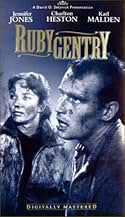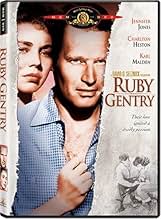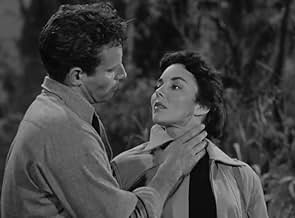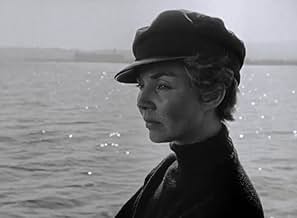Ruby Gentry
- 1952
- 1h 22m
IMDb RATING
6.6/10
1.9K
YOUR RATING
A sexy but poor young girl marries a rich man she doesn't love, but carries a torch for another man.A sexy but poor young girl marries a rich man she doesn't love, but carries a torch for another man.A sexy but poor young girl marries a rich man she doesn't love, but carries a torch for another man.
- Director
- Writers
- Stars
Barney Phillips
- Dr. Saul Manfred
- (as Bernard Phillips)
- …
Peter Adams
- Joage--Golfer
- (uncredited)
Edgar Dearing
- Engineer
- (uncredited)
George Fields
- Harmonica Player
- (uncredited)
Thomas Browne Henry
- Cotton Warehouse Owner
- (uncredited)
Selmer Jackson
- Club Member at Bar
- (uncredited)
- Director
- Writers
- All cast & crew
- Production, box office & more at IMDbPro
Featured reviews
In Braddock, North Caroline, the free-spirited and poor Ruby Corey (Jennifer Jones) is a sexy woman in love with Boake Tackman (Charlton Heston), who belongs to a former wealthy family that lost their land that is flooded. Ruby has lived during high-school with the wealthy businessman Jim Gentry (Karl Malden) and his wife Letitia Gentry (Josephine Hutchinson) that had unsuccessfully tried to teach etiquette to Ruby. Later she returned to the house of her father Jud Corey (Tom Tully) and her pious brother Jewel Corey (James Anderson) in the swamps. When Boake decides to marry the rich Tracy McAuliffe (Phyllis Avery), Ruby is courted by Dr. Saul Manfred (Bernard Phillips) but accepts to marry Jim that has recently widowed.
The population of Braddock does not accept the marriage of Ruby and Jim. Then, Ruby dances with Boake in a club and Jim has a fistfight with Boake and calls Ruby a tramp. On the next morning, Jim apologizes with Ruby and they go sailing. However there is an accident and Jim drowns in the sea. Ruby is accused by the population of murdering Jim and she decides to revenge, using the money she inherited from Jim and foreclosing on the debts of the hometowns. But Ruby is still in love with Boake and her behavior will lead them to a tragedy.
"Ruby Gentry" is a melodramatic romance directed by King Vidor, the master of this genre. The melodrama is excessive, with a wild young woman in love with a popular young man in a conservative town. Her revenge against those that blame her is great but the conclusion is silly. Rubby working as a skipper of a fishing boat does not make sense for a woman with her strong personality (and money). My vote is six.
Title (Brazil): "A Fúria do Desejo" ("The Fury of the Desire")
The population of Braddock does not accept the marriage of Ruby and Jim. Then, Ruby dances with Boake in a club and Jim has a fistfight with Boake and calls Ruby a tramp. On the next morning, Jim apologizes with Ruby and they go sailing. However there is an accident and Jim drowns in the sea. Ruby is accused by the population of murdering Jim and she decides to revenge, using the money she inherited from Jim and foreclosing on the debts of the hometowns. But Ruby is still in love with Boake and her behavior will lead them to a tragedy.
"Ruby Gentry" is a melodramatic romance directed by King Vidor, the master of this genre. The melodrama is excessive, with a wild young woman in love with a popular young man in a conservative town. Her revenge against those that blame her is great but the conclusion is silly. Rubby working as a skipper of a fishing boat does not make sense for a woman with her strong personality (and money). My vote is six.
Title (Brazil): "A Fúria do Desejo" ("The Fury of the Desire")
This is the story of Ruby Gentry, as it is told by the town's doctor. Ruby Gentry was born in the wrong side of the town, she never considered herself a lady, and so nobody else did so. When Boake Tackman returns from North America to his hometown, Ruby Gentry believes that their old passion will keep her dreams alive, and that she will finally win his heart. But Boake (Charlton Heston) betrays her love,and marries a wealthy towngirl. Now Ruby marries Jim Gentry, played excellent by Kard Malden, the richest person in the town, but after some months he dies and the whole town turns against her, believing that she has caused his death. Ruby tries to revenge above all, Boake, but with the help of her fanatic christian brother tragedy comes and Ruby looses everything that she wanted.
Jennifer Jones had a big success with this movie, after 5 box-office flops. Its is a well known story, directed very good by Charles Vidor, and supported excellent by Karl Malden. Charlton Heston show the kind of acting that will follow for the rest of his career,and comes out rather convincing.
A good film you would like to see again...(but not a masterpiece)
Jennifer Jones had a big success with this movie, after 5 box-office flops. Its is a well known story, directed very good by Charles Vidor, and supported excellent by Karl Malden. Charlton Heston show the kind of acting that will follow for the rest of his career,and comes out rather convincing.
A good film you would like to see again...(but not a masterpiece)
Charlton Heston is at the height of his hunk stage and played an unusual type, against his rugged, frontier persona. Jennifer Jones is sultry and moody through several decades, backed by the haunting "Ruby" theme. Richard Hyman's harmonica is a perfect compliment to the two lead character types. I think it is even more effective in black and white than it could ever have been in color. Perhaps this element underscores the black and white social mores of the era. This movie is the first to really make me believe Jennifer Jones character is principally an emotionally grounded person, touchable by others. I usually find her too self contained to feel deeply. I have seen this movie several times, and thoroughly appreciate it each time.
The turbulent life of a female sea captain is revealed. Jennifer Jones does quite well in the meaty leading role of Ruby, a swamp girl from the Carolinas who infiltrates an indifferent high society after marrying wealthy businessman Karl Malden. However, that marriage was just a convenience for this hellcat, who has pined her whole life for intrigued childhood hunting pal Charlton Heston, himself a recent newlywed to a girl who hails from the right side of the tracks. Silvia Richards' screenplay, which originated from a story by Arthur Fitz-Richard, is alarmingly direct, cutting right to the action despite a few well-placed flashbacks. Still, the narrative is somewhat confused (who's telling this story? If it's supposed to be Bernard Phillips' smitten doctor, he isn't around a whole lot). Jones sidesteps camp (just barely) with some enjoyably wild behavior in the film's second-half, and yet this portion of the movie doesn't quite fit comfortably alongside the rest--it plays almost like an unrelated episode. Director and co-producer King Vidor's strongest work comes in the earliest sequences, which have a well-wrought sense of character and pacing which the finale tends to lack. **1/2 from ****
It's no big surprise that RUBY GENTRY receives such mixed reviews, because the theme of the film will not appeal to small-town America. Ruby is a girl from the wrong side of the tracks, as the narrator at the beginning of the film states. What this is code for in classic Hollywood is not necessarily straight translation. In other words, we are in the realm of a lost art form: the romantic film, or the melodrama. King Vidor was a master of this craft.
Ruby, then, was different. She was a free spirit, an unconventional thinker, and a seductive beauty. This is a lethal combination in the small, conservative town Ruby grows up in. She falls in love, of course, with the 'popular' boy, the rich kid, who the most well-bred society girls are after. Of course none of them have anything except their money against Ruby, and Boake (Charlton Heston) knows it! So there is an essential conflict between what Boake wants (Ruby) and what he is expected to have. He, unlike Ruby, is rather weak, and afraid. Deep down he loves her, but he lacks her spirit and wisdom. He won't go after someone looked down on by the town. He has to be 'respectable.' He cares what others think. Ruby does not, so she is willing to fight for him, but at the same time she does not want to be taken for granted. She wants her love to be fulfilled through marriage; he only wants her as a sex object.
I think it is important to note that Ruby Gentry is not necessarily a femme fatale, nor does she necessarily sin. She simply follows her heart. However, a series of accidents, including the death of her wealthy husband, occur, and Ruby is involved in scandal after scandal. The people always choose to believe the worst of her because she represents what they despise: an independent woman with beauty and natural intelligence, and class mobility.
RUBY GENTRY is a masterpiece. King vidor, my favorite director, is at the top of his form. Jennifer Jones, a talented and underrated actress, makes Ruby both sympathetic and believable. Charlton Heston is extremely effective as a complex character--one who on the surface seems shallow, but beneath the surface you can still feel his love for Ruby (which he struggles to hide, or deny).
Boake and his family feel they are above Ruby. Even Ruby's brother is judgmental and calls her a 'sinner,' based on assumptions. The final event in the film is a tragedy, but noteworthy because it was not the fault of Ruby or Boake, but a judgmental, hypocritical, and merciless society, imposing religious and social institutions which hinder us all.
The film is not dated. If anything, it proves melodrama is more effective than realism sometimes, where larger-than-life human emotions are concerned. People who call a movie like RUBY GENTRY 'trash' are actually in denial that the theme, and the emotions, are as vividly real and relevant now as ever. Anyone who thinks social class, sex appeal, and money do not count for everything in today's world, just as then, hasn't a clue. These are timeless themes, and the relationships in the film, and how they were negatively affected by the prejudice and snobbery around them, can be compared to any number of contemporary homosexual or interracial relationships, among others. How's that for relevance?
Sometimes the bigger emotions, the tragedies, are more appropriately told in melodramatic terms--because they are serious and heartbreaking and should not be reduced to cinematic language that conveys anything less!
Ruby, then, was different. She was a free spirit, an unconventional thinker, and a seductive beauty. This is a lethal combination in the small, conservative town Ruby grows up in. She falls in love, of course, with the 'popular' boy, the rich kid, who the most well-bred society girls are after. Of course none of them have anything except their money against Ruby, and Boake (Charlton Heston) knows it! So there is an essential conflict between what Boake wants (Ruby) and what he is expected to have. He, unlike Ruby, is rather weak, and afraid. Deep down he loves her, but he lacks her spirit and wisdom. He won't go after someone looked down on by the town. He has to be 'respectable.' He cares what others think. Ruby does not, so she is willing to fight for him, but at the same time she does not want to be taken for granted. She wants her love to be fulfilled through marriage; he only wants her as a sex object.
I think it is important to note that Ruby Gentry is not necessarily a femme fatale, nor does she necessarily sin. She simply follows her heart. However, a series of accidents, including the death of her wealthy husband, occur, and Ruby is involved in scandal after scandal. The people always choose to believe the worst of her because she represents what they despise: an independent woman with beauty and natural intelligence, and class mobility.
RUBY GENTRY is a masterpiece. King vidor, my favorite director, is at the top of his form. Jennifer Jones, a talented and underrated actress, makes Ruby both sympathetic and believable. Charlton Heston is extremely effective as a complex character--one who on the surface seems shallow, but beneath the surface you can still feel his love for Ruby (which he struggles to hide, or deny).
Boake and his family feel they are above Ruby. Even Ruby's brother is judgmental and calls her a 'sinner,' based on assumptions. The final event in the film is a tragedy, but noteworthy because it was not the fault of Ruby or Boake, but a judgmental, hypocritical, and merciless society, imposing religious and social institutions which hinder us all.
The film is not dated. If anything, it proves melodrama is more effective than realism sometimes, where larger-than-life human emotions are concerned. People who call a movie like RUBY GENTRY 'trash' are actually in denial that the theme, and the emotions, are as vividly real and relevant now as ever. Anyone who thinks social class, sex appeal, and money do not count for everything in today's world, just as then, hasn't a clue. These are timeless themes, and the relationships in the film, and how they were negatively affected by the prejudice and snobbery around them, can be compared to any number of contemporary homosexual or interracial relationships, among others. How's that for relevance?
Sometimes the bigger emotions, the tragedies, are more appropriately told in melodramatic terms--because they are serious and heartbreaking and should not be reduced to cinematic language that conveys anything less!
Did you know
- TriviaAccording to Charlton Heston, Jennifer Jones broke two bones in her hand hitting him in a fight scene. As a result, Jones had to wear several bracelets covering up a cast.
- GoofsThe swamp background noise instead of being NC wildlife is jungle noises - Perhaps the same sound clip from Cape Fear with Gregory Peck. Both were to have taken place in the swamps of NC - yet both sounded like something out of Tarzan.
- Quotes
Ruby Gentry: Turn off the pumps.
- ConnectionsEdited into Histoire(s) du cinéma: Une histoire seule (1989)
Details
Box office
- Budget
- $525,000 (estimated)
- Runtime
- 1h 22m(82 min)
- Color
- Aspect ratio
- 1.33 : 1
Contribute to this page
Suggest an edit or add missing content






































